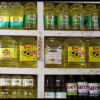Cut import taxes on sunflower, canola oil: Tariff Commission

The Bangladesh Trade and Tariff Commission (BTTC) has recommended that the government reduce import taxes on sunflower oil and canola or rapeseed oil to offer a greater range of cooking oils in the markets.
At present, crude sunflower oil importers are required to pay a total of 31 percent of their purchase price in duties and taxes while for the refined version it is 32 percent.
For raw canola oil it is 37 percent while for the refined version it is 58 percent, the BTTC said.
On the other hand, lower taxes are applicable on the import of soybean and palm oil, which meet most of the demand for edible oil through imports.
On November 19, the National Board of Revenue (NBR) reduced the value added tax (VAT) on the import of soybean oil and palm oil to 5 percent from 10 percent to maintain adequate supply and contain prices in the local market.
The reduction will stay in effect till December 15.
Afterwards, refiners will be able to import crude soybean and palm oil on payment of a 15 percent VAT.
Refined soybean oil imports will face a total of 20 percent in taxes and VAT, the BTTC said.
In a letter to the NBR last week, the BTTC said sunflower and canola oil do not enjoy similar treatment like soybean and palm oil in terms of tariff and taxes, though the former is popular globally.
And high duty and taxes on these edible oils have made their supply and prices prone to frequent fluctuations in the domestic market, despite the fact that their prices are almost the same as those of soybean and palm oil in the international market.
"As a result, consumers' choices have been squeezed. On the other hand, high dependency on palm and soybean has created risks in the market," it said.
Bangladesh's importers brought 7,985 tonnes of crude sunflower oil and 5,093 tonnes of refined sunflower oil this fiscal year, the BTTC said citing data of the NBR.
The latest import is much higher than the 2,607 tonnes of refined sunflower oil imported a year ago.
The amount of canola or rapeseed oil that was imported in the previous two fiscal years was very negligible.
The BTTC's recommendation comes as prices of both soybean and palm oil have soared globally because of export duties imposed by palm oil producing countries to produce biodiesel.
Indonesia, the world's biggest palm oil producer, plans to tighten supplies of the vegetable oil, and it is seeking to ramp up to biodiesel containing 40 percent palm oil from 35 percent to cut its energy imports, reports Reuters in October.
The plan, if implemented, could see biodiesel consumption rise to 16 million kilolitres next year. The move would involve the additional use of 1.5 to 1.7 million tonnes of palm oil, leading to lower export volumes, it added, citing Oil World Senior Analyst David Mielke.
The World Bank commodity prices data showed that palm oil prices rose 6 percent year-on-year to $937 in the July-September quarter of this year from $886 a tonne a year ago. Palm oil prices soared, particularly in August and September, the data showed.
Influenced by increased prices in the global market, both soybean and palm oil prices edged up too over the last one month.
The BTTC said other edible oils could be the best alternatives to palm and soybean oil.
"But high import duty discourages imports," it said, adding that these two oils have been considered as luxury items, though it should not be.
"So, rationalisation of the tariff rates is needed to ensure diversity and stabilise the prices of edible oil in the domestic market," it added.
The commission estimates Bangladesh's annual demand for refined oil at 23 lakh tonnes and that 90 percent of the requirement is met through imports.

 For all latest news, follow The Daily Star's Google News channel.
For all latest news, follow The Daily Star's Google News channel. 





Comments